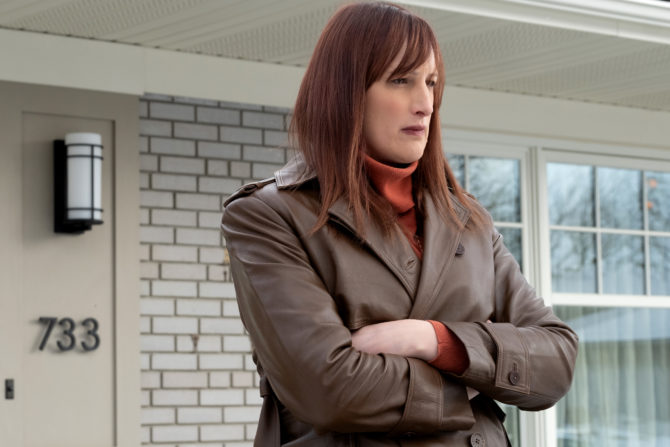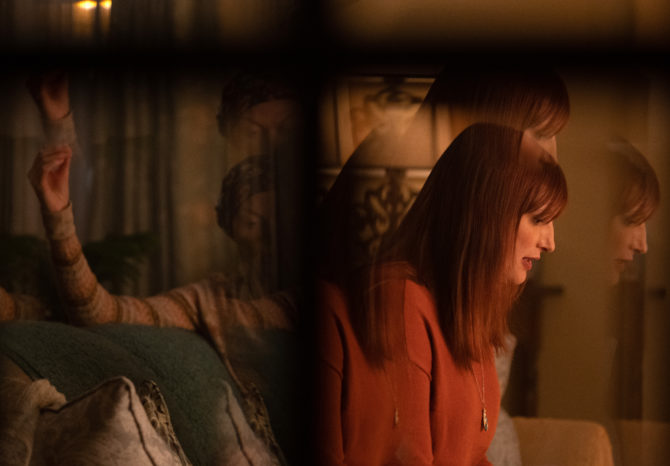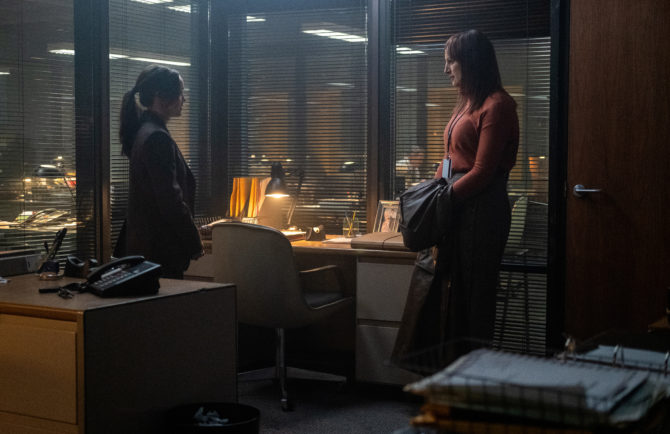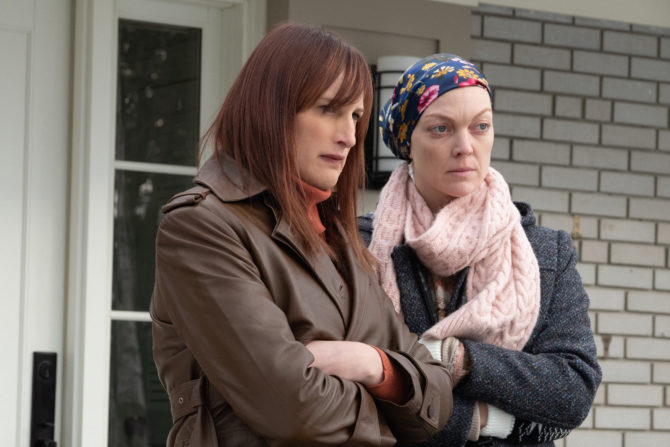 Jen Richards pictured as Julia Lawson
Jen Richards pictured as Julia Lawson
Photo: Brooke Palmer © 2020 CBS Broadcasting Inc. All rights reserved
Jen Richards has made a career for herself speaking out and being sincere. Her digital series Her Story, in which she wrote and starred, heralded her as one of the emerging voices of transgender people in show business. Her subsequent work in Nashville, Tales of the City, and Ms. Fletcher also won her high praise, as did her appearance in the 2020 Disclosure documentary.
Now Richards is stepping into creepy territory with a recurring role on the CBS Thursday night crime drama Clarice. She also acts as a consultant for the show. The show follows the iconic heroine of The Silence of the Lambs following the capture of serial killer Buffalo Bill and the escape of Dr. Hannibal Lecter. While dealing with her own trauma from the case, Clarice (now played by Rebecca Breeds) begins to investigate another round of untimely deaths. The FBI suspects a serial killer, although Clarice has doubts. In the series, Richards stars as Julia, an accountant for a pharmaceutical company with information suggesting the murders are somehow related to the company.
For Richards, stepping into the role of Julia represents a moment of personal and professional catharsis. Disclosure fans – and longtime Queerty readers – will know the actress has an intense personal connection to The Silence of the Lambs. More on that in a moment.
We took some time to discuss this personal connection to Richards, the legacy of Silence of the Lambs, and the evolution of portrayals of transgender characters just before it was introduced to the series. Richards joins the cast of Clarice for a multi-episode arc starting May 13.
So I think the best place to start might be to recognize that you have a deeply personal connection to this story. When we previously chatted for Ms. Fletcher, you told me a haunting anecdote about dating a friend who thought being transgender meant you were like Buffalo Bill. Thesilenceofthelambs.
Yes.
You repeated this story in Disclosure. So the idea that (gasps) Jen Richards Clarice that’s a bit of a big deal. When this opportunity presented itself, what was your reaction?
Isn’t it weird what a full circle is?
 Jen Richards pictured as Julia Lawson
Jen Richards pictured as Julia Lawson
Photo: Brooke Palmer © 2020 CBS Broadcasting Inc. All rights reserved
It’s incredible.
I have to admit I had no apprehension because it first came to me through Nick Adams at GLAAD. I love and trust Nick. He is the director of trans representation. He called me and told me about the show and what Alex Kurtzman, Elizabeth Klaviter and Jenny Lumet saw Disclosure and realized that they needed to do something. So the way it was presented to me, just from the start, I knew they would do well.
That’s wonderful.
I had friends who worked on the Star Trek shows Alex is doing it, so there was enough ground to think it was a good opportunity. And I had just become a consultant at the start. I was going to be there to help shape the character and help them avoid any potential pitfalls. I thought they would play the part with someone younger.
[Laughter]
I felt like I was far enough away from him that if everything went wrong, I could get away from him. Then they asked me to be there. At the time, I was in the writer’s room and came to believe that everyone was on the same page. They asked smart questions. They really cared. I never felt thirsty. And they actually had another trans writer, Eleanor Jean, who was also a writer on Mrs Fletcher, write the arc of the first episode. So all the pieces were there. And I went from hoping it wasn’t bad to thinking it could be really good.
Impressive. What were your apprehensions participating in this role? It’s one thing to write for a show that you have an emotional connection with, shall we say. It’s another to actually exist in this world, on screen. Does this have its own burden?
I have to be honest. My first reaction was I’m writing two more TV shows right now and they want me to act? How the hell am I going to do this?
[Laughter]
It also turned out that I would have to leave the country three weeks after my marriage.
Oh my God.
So my main concerns were all very practical. Beyond all that, I was just excited. Acting for me is just fun. At the end of the day, it’s something I love to do. I love to write and first and foremost I am a writer. But it can be very lonely, very isolating, even traumatic when writing dark stuff. So when I’m lucky enough to be on screen, it’s a chance to get out of my own head and out into the world to work with other people. There is a bit of trepidation – just to be a trans actor on screen, I know there will be negative feedback to that. So if I had any concerns it was just to be on a televised procedure.
Sure.
CBS has a slightly more conservative audience. The proceedings have a more conservative audience. So it was a bit of fear. But it calmed down as soon as I got on set and got to know the cast and crew. Even if someone in the audience doesn’t like to talk about trans issues, the to show oneself is concerned. He supports me and wants this story there. I felt like part of the family from the start. Several of the cast and crew have trans children or trans friends. It’s such a different world. All my fears are dissipating now.
 Pictured (LR) Rebecca recurs as Clarice Starling and
Pictured (LR) Rebecca recurs as Clarice Starling and
Jen Richards and Julia Lawson
Photo: Brooke Palmer © 2020 CBS Broadcasting Inc. All rights reserved
Congratulations on your wedding, by the way.
Thank you.
In your first episode, Julia and Clarice have a very sharp discussion about the language used by Clarice to talk about the Buffalo Bill affair. It’s not hard to imagine having this conversation with the producers of this series, Jonathan Demme who directed the film or Thomas Harris who wrote the novel. Did you write this dialogue yourself?
I’d love to take the credit for it, but no. It’s Eleanor Jean, and she’s fantastic. Just a really great writer. We certainly talked about the scene in the writer’s bedroom, but Eleanor set it up. I did a bit of improvisation when we were on set, so there are a few things here and there that are my touches. But all credit goes to Eleanor. What I think she did so well in this scene – it has to work on two levels, right?
Yes.
On some level, these are trans people who really speak to Thomas Harris, Jonathan Demme, and the world. It’s the trans community telling the world, “This is how it hurts us.” And even if you say, “Well, they say he’s not really trans,” they were all complicit in this tale that had a material impact on our lives.
Sure.
So we had to work at this level just to get this catharsis for the public. But it also has to work at the character level. You must believe that Julia feels the need to tell Clarice this specifically at this point before helping her with the matter. Eleanor installed this needle really well, and frankly, I think I did too. I think the scene is working really well.
What kind of emotional catharsis does a scene like this give you? As you say, this is a loop moment for you.
It really heals him. He closes a chapter so I can move on. It’s really cathartic. I am such a fan of the film. I love the characters. I love Clarice. I love female characters who try to overcome social oppression and discrimination. I like everything about [The Silence of the Lambs]except that a part that stings. And as a transperson I’m pretty used to media kissing me on one cheek but then stabbing me on the other side. It’s just something you come to live with. But it’s a personal thrill to be able to pull out the knife and show it. It was really deep. And thanks to Deborah Kampmeier, our director, who really wanted the scene to land. She knew the importance of the scene, she did her research. She knew my job. She had seen Disclosure.
It’s great.
She made me improvise the scene to warm me up, and to say a lot more than what you see. Without cutting, I returned to the stage and did it again. I felt all this emotion that I had generated talking about it in the character reported. Most of what you see on the screen. So it’s a beautiful writing by Eleanor, a superb creation of a character by our whole team and a beautiful staging by Deborah. It takes a village to make a time like this work.
And a good actor, I would add.
Thank you.
 Jen Richards pictured as Julia Lawson and Emily Coutts as Erin
Jen Richards pictured as Julia Lawson and Emily Coutts as Erin
Photo: Brooke Palmer © 2020 CBS Broadcasting Inc. All rights reserved
It’s wonderful to watch. The other big issue to address in Julia’s storyline is that she takes a huge risk as a transexual by helping the FBI. This makes her a sort of reluctant hero. But it’s also a problem transgender people still face – the idea that being excluded could ruin a caregiver. How do you think trans people – or queer people in general – should balance community allegiance with a need for privacy?
It’s difficult. There is no one-size-fits-all solution. People have said to me, “Oh, you didn’t have to tell me you were trans. I just see you as an ordinary woman. And there is a certain freedom that comes with that, but there is also an abdication of responsibility. While I can’t speak for anyone else, I know for me, when I became trans, it was the trans community that was there for me. It was 10 years ago. It was a difficult time, and there were people who had a lot more trouble than me. I am thinking in particular of the black trans women in Chicago who I knew reached out to me. The first public event I went to as a transperson was a memorial to a murdered black tranny in Chicago.
Wow.
She was one of the three that year, and there was never any justice. No one has ever been caught. So my entry into the trans …


